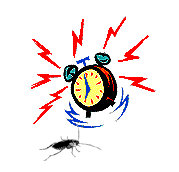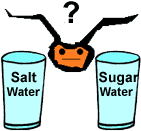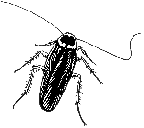Neuroscience For Kids
Cockroaches Don't Learn in the Morning
 November 19, 2007
November 19, 2007
Do you have trouble getting started in the morning? Do you have problems learning early in the day? If you do, you are not alone. Cockroaches have the same problem! They learn better at night than they do in the morning.
 To investigate when cockroaches learn best, researchers at Vanderbilt
University (Nashville, TN) tested the insects for which odor (peppermint
or vanilla) they preferred. Most cockroaches preferred the smell of
vanilla to the smell of peppermint at all times. The scientists then
trained the cockroaches to prefer the peppermint smell by rewarding the
insects with a taste of sugar water when they approached a peppermint
smell and punishing them with a taste of salt water when they approached a
vanilla smell. (Cockroaches like sugar water, but they don't like salt
water.)
To investigate when cockroaches learn best, researchers at Vanderbilt
University (Nashville, TN) tested the insects for which odor (peppermint
or vanilla) they preferred. Most cockroaches preferred the smell of
vanilla to the smell of peppermint at all times. The scientists then
trained the cockroaches to prefer the peppermint smell by rewarding the
insects with a taste of sugar water when they approached a peppermint
smell and punishing them with a taste of salt water when they approached a
vanilla smell. (Cockroaches like sugar water, but they don't like salt
water.)
 When the cockroaches were trained in the early night, they remembered
the new associations (peppermint = sugar water; vanilla = salt water)
for up to 48 hours. However, if the cockroaches were trained in the early
morning, they quickly forgot which smell went with which water. The
effect was dependent on when the cockroaches were trained, not when they
were tested.
When the cockroaches were trained in the early night, they remembered
the new associations (peppermint = sugar water; vanilla = salt water)
for up to 48 hours. However, if the cockroaches were trained in the early
morning, they quickly forgot which smell went with which water. The
effect was dependent on when the cockroaches were trained, not when they
were tested.
So, cockroaches learn better at night than they do in the morning. Because these animals are more active and search for food during the night (nocturnal), it is likely that information they gather at night will be more useful to them. These experiments provide some clues about the interactions between body rhythms, learning and memory, but the brain pathways involved with these functions are still unknown.
Cockroach Facts:
- FACT: Cockroaches can live for weeks without their heads. (Source: Scientific American)
- FACT: Cockroaches can withstand a much higher dose of radiation than humans. The lethal dose of radiation for human is 800 rems or more, but the lethal dose for the American cockroach is 67,500 rems and between 90,000 and 105,000 rems for the German cockroach. (Source: Dept. Entomology, Iowa State University)
- FACT: Cockroaches can run at speeds of nearly 3 km/hr (0.8 miles/hr). (Source: Nature, February 11, 1999)
- FACT: Catnip seems to repel cockroaches (Source: Peterson, C.J., Nemetz, L.T., Jones, L.M. and Coats, J.B., Behavioral activity of catnip (Lamiaceae) essential oil components to the German cockroach (Blattodea: Blattellidae), J. Econ. Entomology, 95:377-380, 2002.)
References and more information:
- Decker, S., McConnaughey, S. and Page, T.L., Circadian regulation of insect olfactory learning, Proc. Natl. Acad. Sci. USA, 104:15905-15910, 2007.
- Gordon, D. G., The Compleat Cockroach: A Comprehensive Guide to the Most Despised (And Least Understood) Creature on Earth, Berkeley (CA): Ten Speed Press, 1996.
Copyright © 1996-2007, Eric H. Chudler, University of Washington
